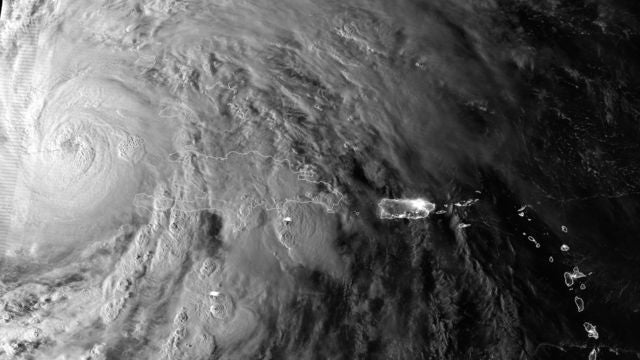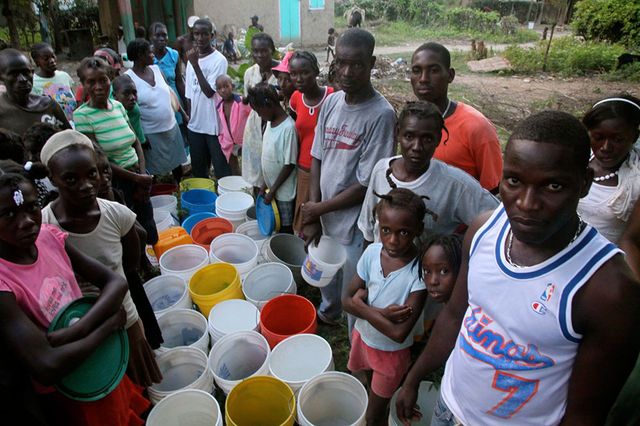
Hurricane Sandy did not hit Haiti directly. It passed to the
west, crossing over Cuba. Even so, it dropped roughly on the
southern part of the island, where decades of deforestation and erosion led to increasingly
swollen rivers and flooding that devastated low-lying communities, destroyed
crops, and caused —the highest number of fatalities in the
Caribbean.
The country is from the 2010 earthquake.
More than 350,000 people live in refugee camps that are little more than tents.
The leading causes of death are
HIV, tuberculosis, and —a disease that came into the country with relief
workers and has infected more than 600,000 and killed more than 7,500 people. Even before the quake, the per capita income was .
Sandy . The U.N. estimates that the hurricane's effects, combined with a drought that hit the country earlier in the year, could leave more than . As a result, the Haitian government and the Food and Agriculture Organization of the U.N. have asked for in aid. “Whatever was left of a potential harvest is gone,” Johan Peleman,
head of the United Nations Office for the Coordination of Humanitarian
Affairs. “Even the banana harvests seem to be gone.”
In addition, people in the flooded refugee camps and southern villages have been left , a waterborne disease. To find out what is happening on the ground, we called Dr. Ralph Ternier.
Ternier grew up in Haiti, and always wanted to be a doctor. He graduated with a medical degree from the State University Medical School in 2002, became the director of an HIV, tuberculosis, and STD clinic in 2003, and helped hundreds of Haitians return to their homes after the 2010 earthquake. Now he works as the director of community care and support for the health care non-profit, in Haiti, a position he views as destiny. “I always wanted also to work in public health. I never thought I would work in private,” he says. “I would say that I am in the right place and the right time.”
What is an average day like for you in your job?
That’s a tough question. We work every day, on holidays, on New Year’s Eve, and Christmas. At Partners In Health, we say we work until the last patient. We are not a formal organization with weekends. We are really embedded in this philosophy, so we work all day and weekends if needed.
Are you in a clinic or out in the field?
I spent seven or eight years running an HIV program at the Haitian and Dominican border. Now I am the community chair, so I’m overseeing activities in the entire central region, and overseeing cholera treatment and prevention efforts on Haiti’s Central Plateau.
What sorts of issues have resulted from the hurricane?
The hurricane caused the greatest damage in the south of Haiti, but the government declared a state of emergency across the entire country last week. You’re going to have people suffering from hunger. Mostly, we are witnessing displaced people. People who lost their houses and everything they had. That adds more pressure. You’re going to see the government spending money on relief efforts—money that could have been spent in this situation.
So money that was going to rebuilding after the earthquake now has to go to hurricane relief?
Yeah.
And how will that affect things?
Especially in the capital region, that’s going to make people more vulnerable to diseases. You are going to see people leaving for other places to get care. So you are going to have more people coming from the south or the west to central Haiti.
They may move from the south to your region. And what will happen when they do that?
Thank God we’ll be able to host them in terms of care, in terms of free care, but it’s going to require more resources to welcome all of these patients. Because our resources are specific to our area, and we are facing some shortages in some funds, that’s going to put pressure on us.
How big is the fear of cholera coming up again?
We have seen spikes even before the hurricane. [In September, after Hurricane Isaac, more than 900 patients came to Zanmi Lasante cholera treatment centers for help, and the center had to hire back more staff to care for these patients.] From maybe April to June or July the rate was maybe five patients a day. Before the hurricane it’s around 15 patients a day. I know, in the south, even before the hurricane, they were seeing even higher numbers of patients daily, because they were lacking the resources to take care of cholera. So I think they are going to have a lot of cases. That’s one of the worries for the government.
How bad could it get?
What is always one of the major issues in cholera is to see 10 or 15 people dying foolishly in maybe one hour. That is frustrating. That shouldn’t happen. That is what is going to happen. For something that could have been prevented easily, you are going to have a lot of deaths. When you have that spike, people are going to be coming from very far. By the time they reach the health center, they will die. And they will die because there isn’t enough funding to keep cholera treatment centers open and staffed in their communities.
What do you need right now to help out?
So, right now, a lot of partners are closing because of the shortage of funds and because people think that cholera is low—that they have reduced the caseload. I agree, but they have said also that cholera is going to stay in Haiti for 10 years, so we have to have some places where people can get care if they have cholera. We know that cholera is prevented with good hygiene and good sanitation, but if someone has cholera, where are they going to find treatment? The ministry doesn’t have the means to do that alone. Our last funders just told us it’s our last help for cholera. So I think we definitely need people not to be distracted by the fact that cholera has been reduced. But the danger is here because the hygiene and sanitation that’s going to erase cholera from Hispaniola is not for tomorrow or today. It’s going to take years to have that good sanitation.
What is the sanitation like there now?
Just an example—yesterday I went to central Haiti. Most of the people there are still drinking water from contaminated sources. They live very far away, and they tell us that by the time they get transportation to the hospital, family members have died. So, the national company, which does the sanitation and hygiene work, they are doing a very good job, but they won’t be able to install a good sanitation structure in one year. They don’t have the means to do that. By the time they are done a lot of people are going to die. One of the things the ministry is going to do—I know they have started—is to vaccinate people against cholera. As they are installing good hygiene and sanitation, they need to vaccinate people. I know we’ve seen some donations in terms of vaccination, but they need to vaccinate even more people who are most vulnerable.

How does the high number of people living in refugee camps affect sanitation and health?
If you have cholera in these units, it can spread so easily. I’ve been in those camps, and I know that hygiene and sanitation are not very well managed there. And also, because of lack of funds, I wouldn’t be surprised if there is no cholera treatment clinic. They would have to go somewhere, but there are really few partners who are still doing the treatment of the sick.
And so if people really take one lesson of how this hurricane has affected Haiti, what should they know?
You are going to have more people under tents, more people with vulnerability. Because when you don’t have a home, you are at risk to get more diseases. And also, the hygiene has been affected. Those people are very much at risk of drinking unclean water. So this is the kind of burden that this hurricane has caused. At a higher level, because the government has to deal with that emergency, they are going to displace money from long-term projects. It is going to be a vicious cycle.
Is there anything that I didn’t ask?
Maybe. We need people to understand that cholera is not gone in Haiti. Each time that you have a disaster, diseases can lead to more disaster. People are going to be at risk of bad hygiene, unsafe water, and this is a kind of burden that’s going to be added to what we already have. And the shortage of funds, from the international community, is one of the components that will worsen the burden.
For more, go to
This is the third in a series of interviews on the effects of Sandy.
Part 1: Hurricane Researcher Brian McNoldy on the Science Behind Sandy
Part 2: Andrew Revkin on the Lessons Learned From Sandy
—Joe Spring